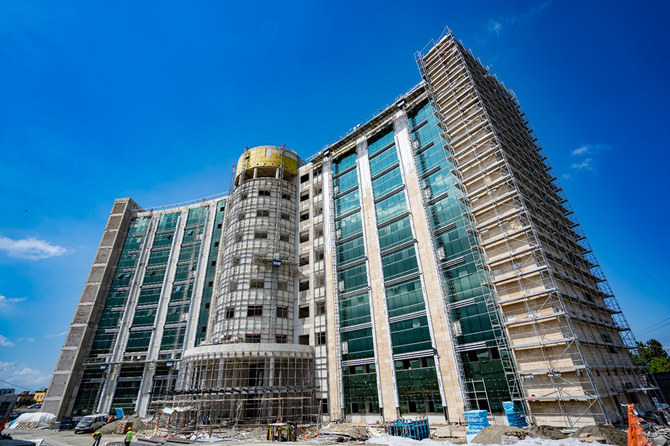ANKARA: A new hospital developed with support from the EU is set to open early next year in southern Turkey to help meet the needs of an ever-growing community of Syrian refugees.
The 250-bed facility, in the border district of Dortyol in Hatay province, is a collaborative project between Turkey’s health ministry and the EU. It is set to cost about €40 million ($45 million), with the scheme managed by the ministry and the French Development Agency.
“This is a much-needed move,” Omar Kadkoy, a migration policy analyst at Ankara-based think tank TEPAV, told Arab News.
“There are several migrant healthcare centers across Turkey providing limited medical services, but building a hospital will ease the pressure on Hatay’s overall health infrastructure while guarding the quality of services for the members of the host community and Syrians,” he said.
Authorities expect the facility to serve about 6,000 patients per day and help to create a health hub for both the local community and refugees, especially those coming from war zones.
Kadkoy said the hospital would help to address the serious capacity shortage in northwest Syria.
“The healthcare system in the northwest is struggling to cater to the medical needs of 4 million Syrians, while falling every now and then under the attack of the Syrian army and its allies. On top of it all, the COVID-19 pandemic continues to exacerbate the already thinly stretched healthcare system in the area,” he said.
Hatay is home to more than 430,000 registered Syrians, who make up 26.4 percent of the province’s total population. It is the third-largest such community in the country, after Istanbul (more than 530,000) and Gaziantep (about 450,000). There are about 4 million Syrians across the whole of Turkey.
Metin Corabatir, president of the Research Center on Asylum and Migration in Ankara, said the growing refugee population in border provinces had made it challenging for both locals and migrants to get access to healthcare services.
“Therefore, the international community’s assistance in building and renovating the necessary healthcare infrastructure in the targeted regions is very significant for managing health issues for all, not only for disadvantaged groups,” he told Arab News.
Corabatir also highlighted the need to provide translation services at healthcare facilities.
“A lucrative market is being developed around hospitals for refugees who are desperate to access healthcare services. As they are not fluent in Turkish, they have to pay large sums of money to groups who help them with translation services,” he said.
But not everyone could afford to pay, he added.
“Therefore, free-of-charge translation facilities should be made an integral part of these new healthcare projects,” Corabatir said.
The EU has so far provided Turkey with €780 million in healthcare funding, which has helped to pay for 430 ambulances and more than 177 health centers for refugees.
Under a long-running EU-funded scheme, known as the SIHHAT Project, the Turkish government has sought to improve access to healthcare for Syrian refugees in 29 provinces.
Hundreds of Syrian doctors and healthcare workers have also received training in Turkey under World Health Organization schemes.
The development of the new hospital in Dortyol came after Turkey in November ratified a €79.3 million agreement with the EU to improve healthcare infrastructure for refugees in the country.
The deal covers the construction and renovation of several health centers, physiotherapy and rehabilitation units in public hospitals, and the procurement of medical equipment and supplies.
Kadkoy said: “It is crucial for the EU and Turkey to continue such cooperation because safeguarding the well-being of vulnerable groups is a universal obligation and building the hospital is just another sign that responsibility-sharing is limitless.
“The Turkish-Russian agreement has so far shielded northwest Syria from large-scale military offensives and their bloody consequences. But the situation remains fragile. A military escalation could push thousands across the border to seek safety and look for medical attention. Therefore, building the hospital represents a precautionary measure to contain the outcome of a similar scenario if it unfolds in the future,” he said.
Another hospital, in the southern Turkish province of Kilis, on the border with Syria, is also being built in partnership with the EU.

























